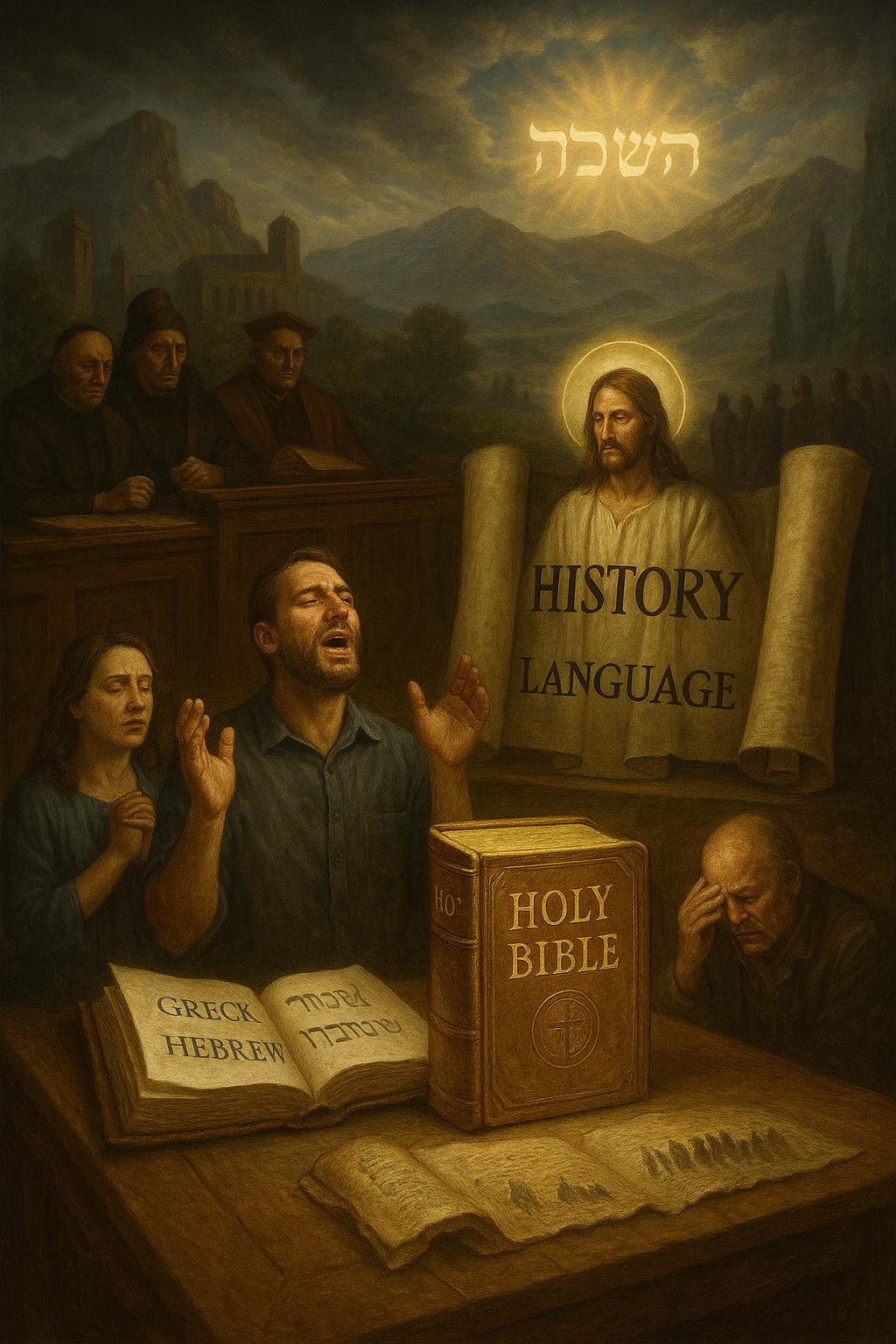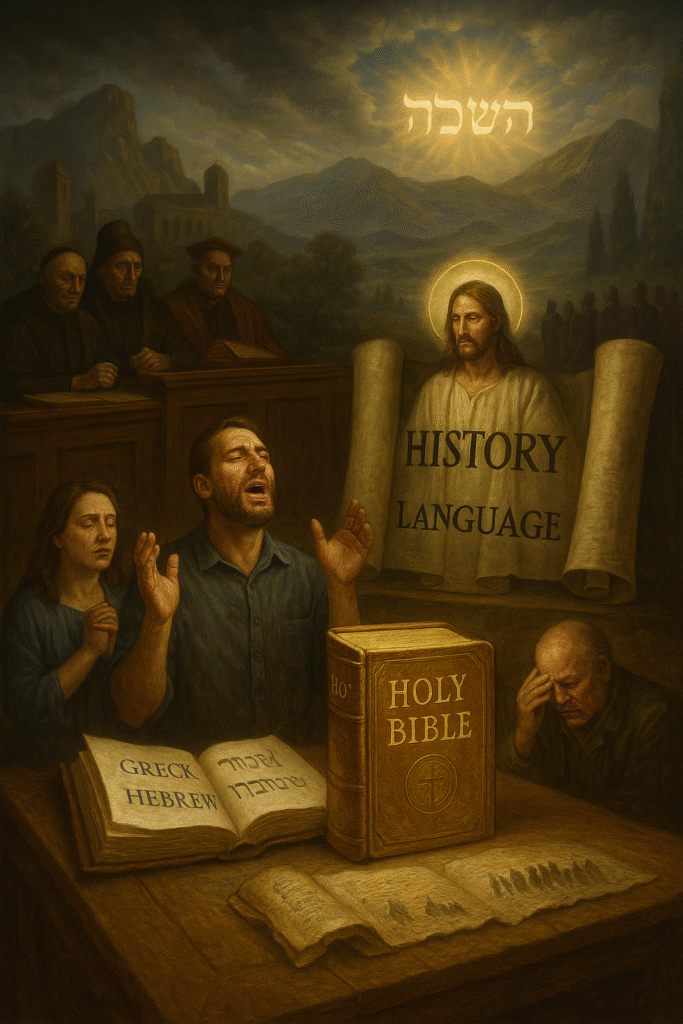Physical Address
304 North Cardinal St.
Dorchester Center, MA 02124
Physical Address
304 North Cardinal St.
Dorchester Center, MA 02124
With Michael Walker
With Michael Walker

To Whom it may concern…

There comes a moment when the laughter dies in your throat and is replaced by grief so deep it cannot be ignored. At first, watching modern “Christians” defend their faith is almost comical in its blindness. They brandish phrases, quote verses from translations they do not understand, and pour all their passion into defending something they never bothered to investigate. Their ignorance of biblical history is staggering. Their ignorance of biblical linguistics is staggering. Their ignorance of the very Word itself is staggering. At first glance, you might smirk at their foolishness and shake your head at the irony of people arguing so fiercely for something they cannot even define. But reflection turns hilarity into tragedy. The more you look at their devotion, the clearer it becomes that their ignorance is not neutral—it is devotion to an idol they do not even know. They cling to a Roman counterfeit and call it the Word of God. They fight for it as though they are defending truth, yet in reality they are defending a distortion. What makes it so tragic is that their zeal is sincere, but it is misplaced. They love what Rome handed them, not what God revealed. And that should not make us laugh. That should make us weep.
The problem begins with the way people approach the faith itself. They believe that if something is handed to them, then it must be true. If they receive a translation, they assume it is pure. If they inherit a tradition, they assume it is holy. But this is not how truth works, and this is not how covenant works. You cannot just be handed something and call that devotion. You cannot just be handed something and assume this is the final word. And you certainly cannot just be handed the written manifestation of the Creator’s Word and feel no responsibility to verify it. Devotion without examination is not devotion—it is negligence. If you have never traced the Bible’s history, if you have never studied the languages in which it was spoken, then you do not know the Word itself. And if you do not know the Word, how can you claim to have a relationship with the One who gave it? Relationship requires knowledge, and knowledge requires effort. True devotion requires investigation, not blind inheritance.
The analogy of relationship helps us see this with piercing clarity. Imagine if the Bible were a profile on Tinder. People swipe right based on appearances alone, just as they accept the English Bible without further inquiry. But real relationship does not stop at first glance. When you meet someone you hope to know deeply, you go beyond the surface. You run a background check. You interrogate their past. You ask about their family, their story, their language. You pay attention to their profile details. You discover who they are beneath the surface. In the same way, the Bible must be treated as a living profile. You must ask it where it came from. You must ask it what language it speaks. You must read the details it reveals about itself. When you do this, the Bible’s true profile becomes clear. You can see how Rome doctored it, how translators flattened it, how layers were stripped away. Only then do you see the living Word for who it truly is. Only then do you discern the counterfeit from the authentic. Discovery is the relational process by which the idol collapses and the true identity is revealed.
This is why both history and linguistics are nonnegotiable. History tells you how the Word came down through time, who handled it, who preserved it, and who corrupted it. If you ignore history, you simply repeat Rome’s narrative without realizing it. You accept the decisions of councils, popes, and priests as though they were the voice of God. Linguistics tells you what Yahweh actually spoke. Hebrew was chosen because it carries multidimensional depth. Greek was chosen because it carries unparalleled precision. But Latin and English flatten both, stripping away covenantal layers and compressing divine nuance into reductionist terms. If you ignore linguistics, you speak about the Word without ever hearing it in its own tongue. Only when you hold both lenses together—history and linguistics—do you see the Word clearly. Only then can you discern what is authentic revelation and what is empire’s counterfeit.
The concept of discovery is the perfect frame for this process. In law, discovery is the stage where all evidence must be uncovered and made plain. Every document, every testimony, every fact must be laid bare. Applied to the Bible, discovery means asking the necessary questions: Who authored this? What language did they use? How was it transmitted? Who altered it? What survives intact? Discovery refuses to let assumption masquerade as truth. It uncovers what has been hidden and forces it into the light. Discovery is not about doubt; it is about fidelity. It is about honoring the Word by refusing to take anyone’s word for it—not Rome’s, not the translators’, not tradition’s. It is about letting the Word answer for itself.
When you apply discovery to the Scriptures, the Bible’s profile begins to unveil itself. Ask the Bible its history and you will see the counterfeit root of Rome, the imperial councils that reshaped it, and the idolatrous system that claimed to own it. Ask the Bible its language and you will hear the covenantal richness of Hebrew, the exacting precision of Greek, and the tragic poverty of English. Ask the Bible its identity and you will realize that what most defend as “the Word” is not the original at all—it is a distorted reflection. The name Yehoshua was given in covenant clarity, but Rome transfigured it into Iesous and later Jesus, stripping away the Name of Yahweh embedded in it. Words like marriage, slavery, sin, and law were bent to serve cultural convenience rather than covenant fidelity. Even the very identity of the ekklesia was replaced by “church,” redirecting devotion from a living body to an institution. These are not small matters. They are the difference between knowing the Beloved and being catfished by empire.
The tragedy of counterfeit devotion is immense. People believe they are serving the Word, but in reality they are bowing to Rome’s idol. They sincerely love, but they sincerely love the counterfeit. They believe they are honoring God, but they are perpetuating the distortions of man. And this ignorance is not innocent. It is rebellion disguised as piety. To love what Rome created is to misplace devotion. To call the idol the Word is to deny the One who spoke. That is not just error; it is apostasy dressed in the clothes of faith. And yet, this should not provoke scorn. It should provoke grief. Because behind every counterfeit defender is a soul that longs for truth but has been blinded by tradition. They are prisoners of Rome’s narrative, not knowing the freedom that comes from discovery.
This is why discovery must be laid out as a clear framework. The first phase is the background check: trace the roots of what we were handed, identify where empire overrode covenant, understand the councils, the creeds, and the canonization. The second phase is the profile study: dive into the languages of Hebrew and Greek, study their layers of meaning, compare them to the poverty of Latin and English, and see how translation has reshaped understanding. The third phase is evidence interrogation: examine who changed names, who shifted meanings, who rebranded identities. The final phase is truth unveiled: expose the counterfeit, behold the living Word, grieve the blindness, and embrace the restored truth. This is not optional. It is the only way to move from ignorance to fidelity.
In the end, the call is clear. We cannot laugh at ignorance forever. We cannot shrug at counterfeit zeal. This is not a game. We are not mocking the blind, we are mourning their blindness. We are not dismissing faith, we are demanding fidelity. Devotion without discovery is not devotion. It is worship of an idol. The Word deserves lovers who know its history, who speak its language, who understand its identity. Anything less is counterfeit worship of a counterfeit god. Discovery is not an academic exercise—it is the gateway to authentic relationship with the Living Word. It is the difference between defending Rome’s idol and walking with Yahweh’s revelation. And that difference is eternal.
So let us stop mistaking possession for knowledge. A bound volume in the hand is not communion with the One who spoke creation into being. Devotion begins where convenience ends—at the threshold of history and language. We must question what we were handed, not to destroy faith, but to strip away scaffolds of empire and reveal the Beloved. We must ask the Bible its own name, in its own tongue. We must let centuries speak, not as fog but as the clear air in which revelation breathes. Only after discovery—after history and linguistics strip away the cosmetics of the counterfeit—do we behold the Scriptures in their true profile and consent to be read by them. Anything less is borrowed zeal in service of an idol. But discovery—discovery is where the counterfeit collapses and the true Word rises. And once you have seen that face, you cannot unsee it, and you will never again mistake the idol for the Beloved.